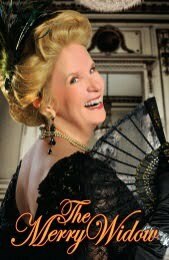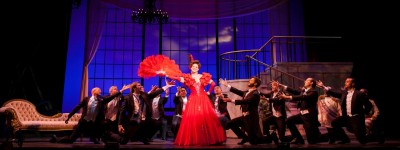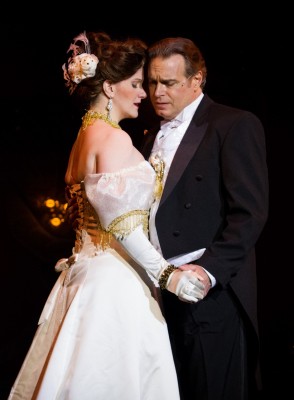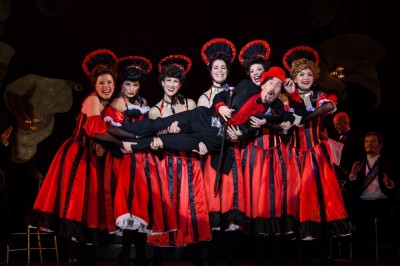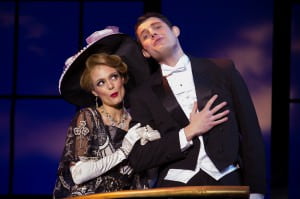The Merry Widow
English Adaptation by Jack Helbig
and Gregg Opelka
German Libretto by Viktor Léon and Leo Stein
Directed by Rudy Hogenmiller
Conducted by Nyela Basney
Produced by Light Opera Works
Light Operetta Has Major Talent
Franz Lehár’s 1905 masterpiece The Merry Widow epitomized why operettas were the preferred form of dramatic entertainment in early twentieth century Europe. It’s a silly, light-hearted story about love that exists only to provide a context for opera singers to dance, joke, and of course, fill up an auditorium with delightful sound. Now at the Cahn Auditorium, Light Opera Works has provided a twenty-nine piece orchestra, excellent production values, and a new English-language adaptation to complement their talented singers and Lehár’s beloved music.
The story takes place in Paris, at the embassy of the fictional country Pontevedro (basically Montenegro). The ambassador, Baron Zeta (Alex Honzen), is throwing a party in honor of his nation’s prince, but his country is in great danger. All Pontevedro’s banks are dependent on the accounts of the late Count Glawari, whose inheritor is the still eligible widow, Hanna (Stacey Tappan). If she should marry a foreigner, she would move her money out of the country, and Pontevedro would be doomed. Hanna is currently residing in Paris, where dozens of young men are courting her. Baron Zeta hopes to fix her up with Count Danilo (Larry Adams), a bachelor of an appropriate age for her who works at the embassy. But Danilo and Hanna had a past relationship and breakup which makes them too prideful to admit their love for each other now. Meanwhile, Baron Zeta’s wife Valencienne (Sarah Wasserman) is carrying on an affair with a young Parisian gentleman, Camille (William Dwyer), who wants to make things public. Misunderstandings result, which Hanna must use her cleverness to resolve.
The leads are all wonderful singers, and play endearing characters. The acting is exaggerated, as it has to be for this kind of story, especially among the twenty-four member chorus. Foolish minor characters often forget things they have just been told and explain jokes to each other. That’s not a flaw in the work, though, just part of the light-hearted atmosphere. Tappan is a gregarious, subtly commanding merry widow, and her aria at the beginning of Act II is rich and full. Adams is an aging but still impressive ladies’ man, whose ode to the nightclub Maxim’s helps keep up the energy in Act I, and he has two sweet duets with Tappan in the second act. Newcomer William Dwyer is a charming match to Sarah Wasserman; he has a powerful tenor voice that will serve him well in his career, and she is a clear, dainty soprano. Alex Honzen and Brian Rooney have the most comedic parts, and are hilarious. Honzen’s bass baritone starts the show off well, and Rooney’s third act vaudeville performance keeps the show fun even as it approaches its third hour.
Hogenmiller’s directing is to thank for the unified happy tone. His choreography is simple, but amusing in combination with the gorgeous design. Jesus Perez and Jane Debondt created three sets of costumes for the three acts, and all of the gowns show remarkable creativity within the same theme. Rooney as Njegus gets an especially fine pair of red boots. Scenic designer Adam Veness likewise make three different looks for the three acts, the most immediately striking of which is the elegant scarlet floral interior of Maxim’s in Act III. Nyela Basney’s conducting is lively throughout Lehár’s varied score, and matches the actors’ energy and volume. The importance of the all-union orchestra to the evening’s fun cannot be overstated.
Fans of The Merry Widow will come away from this production fully satisfied. But it’s also an opportunity for people unfamiliar with operettas to see the genre at its best. This sort of show is a major part of theatrical heritage, and students of theatre and fans of musicals would serve themselves well by seeing it. Helbig and Opelka’s new translation fits the story to modern taste despite the lightness of the story, and is rarely forced or contrary to rhyme and meter. You know when seeing Light Opera’s work that the cost of the ticket is necessary for the production values and talent of the performers onstage and in the pit. It’s a goofy, but well-crafted work that will leave you smiling for hours.
Highly Recommended
Jacob Davis
Playing at Cahn Auditorium, 600 Emerson Street, Evanston. For tickets, call 847-920-5360 or visit www.musictheaterworks.com. Runs through December 31. Plays Friday at 2:00 pm, Saturday at 8:00 pm, Sunday at 2:00 pm, and December 31 at 8:00 pm. Tickets are $34-96. Running time is three hours with two intermissions.

